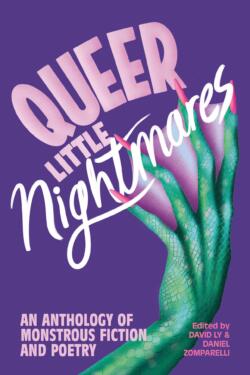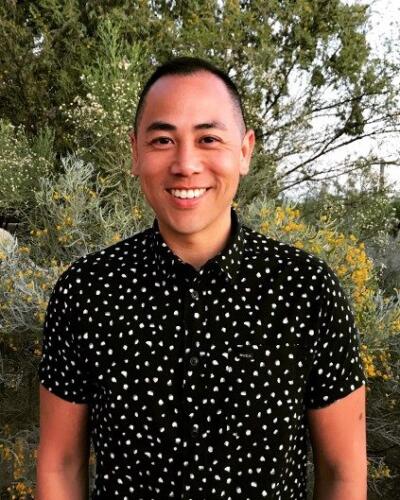1601 Timely monstrosities
Queer Little Nightmares: An Anthology of Monstrous Fiction and Poetry
by David Ly and Daniel Zomparelli (editors)
Vancouver: Arsenal Pulp Press, 2022
$21.95 / 9781551529011
Reviewed by Zoe McKenna
*
 Everybody is afraid of something. David Ly and Daniel Zomparelli’s Queer Little Nightmares: An Antholgy of Monstrous Fiction and Poetry offers a chilling seasonal collection with such a variety of unsettling characters that everyone is sure to encounter something that will keep them up at night.
Everybody is afraid of something. David Ly and Daniel Zomparelli’s Queer Little Nightmares: An Antholgy of Monstrous Fiction and Poetry offers a chilling seasonal collection with such a variety of unsettling characters that everyone is sure to encounter something that will keep them up at night.
Burnaby-based David Ly is the author of several poetry collections, including Stubble Burn, Dream of Me as Water, and Mythical Man, the latter of which was shortlisted for the 2021 ReLit Prize for Short Fiction. Daniel Zomparelli is based in Vancouver, where he has contributed to the poetry scene through his work for Adbusters and later his own poetry magazine, Poetry is Dead. Zomparelli is the author of multiple poetry and short fiction collections, including Everything is Awful and You’re a Terrible Person which won the 2018 ReLit Award for Short Fiction and was shortlisted for the 2018 Ethel Wilson Fiction Prize.
Queer Little Monsters writes back against decades of literature, film, media and social politics that have positioned the LGBTQ+ community as something to be feared and demonized. As Zomparelli outlines in his introduction, “throughout history, monsters have tended to represent the big, scary ‘other.’ The thing we do not understand, so we deem monstrous.” Many members of the LGBTQ+ community have reclaimed this trope, embracing monsters and horror-movie characters as icons. “The queer community loves a monster.”


In addition to penning their own pieces in this collection, Ly and Zomparelli welcome 27 contributors to share their own versions of monstrosity. The collection boasts established names including David Demchuk, Hiromi Goto, and Kai Cheng Thom, as well as making space for emerging authors to cut their teeth in the genre. The contributions include both short fiction and poetry, and range in tone from devastating to comical, and from terrifying to tender. What connects each story is, as Zomparelli explains, “the question ‘What is a monster?’” The inverse of this question is “What is a human?” and throughout the collection each question is asked and answered in dozens of different ways, highlighting the diversity and variety in the ways we relate to folk tales, spooky stories, horror movie characters, and our own identities.

Ly and Zomparelli arrange the collection to create a natural yet purposeful cadence throughout the book, shaping it in a way that makes it difficult to put down. Each piece is innovative and vulnerable in such a way that every reader is certain to find an author they want to read more from. Some stories are campy and playful, while others are serious and contemplative. Some contributors re-envision classic horror stories, such as Eddy Boudel Tan’s “Strange Case” calling upon Strange Case of Dr. Jekyll and Mr. Hyde. These pieces serve as examples of what Ly details in his introduction, the LGBTQ+ community writing against their villainization in literature and film: “[Queer Little Nightmares] pushes back on the idea of monsters as fearsome and give tender and truthful glimpse into human desires and dreams.”
Other contributors chose to create their own, original monsters for this collection, and these stories are some of the most disturbing. In Hiromi Goto’s “And the Moon Spun Round Like a Top,” a premenopausal woman begins to pass sentient blood clots. In David Demchuk’s “Nature’s Mistake,” a humanoid creature is locked in an abandoned theme park for decades, slowly rotting in the darkness. In a genre that feels so saturated with ideas, it’s thrilling to encounter stories such as these that are still able to shock and scare.

The majority of contributions to this collection find balance between the classic and the original, taking concepts that nineteenth-century writers found disturbing and proving that these ideas still have teeth today. Matthew J. Trafford’s “In Our Own Image” calls upon the eerie, off-putting monster creation of Mary Shelley’s Frankenstein, but interlaces a tenderness and intimacy that leaves the story chilling in a way that’s a marked departure from the original text. It is these stories that most clearly outline how the literature that marks the horror canon can be reimagined, repurposed, and reclaimed to make sense of and share queer experiences.
Like all good scary stories, this collection has a way of lingering. It’s easy for memories to become haunted by the disturbing characters and unsettling stories. More than this, however, is the way the core message of this collection persists. Not only does horror serve as a way for LGBTQ+ writers to share their experiences with identity, but as a result, horror has irrevocably been transformed by the queer writers who contribute to it. The evolution of this genre, and how monsters can help us, as humans, understand each other better is something worth mulling over long after the last sinister “boo.”
*

Zoe McKenna recently completed her Master of Arts from the University of Victoria and also holds a Bachelor of Arts from Vancouver Island University. Her thesis, as well as a great deal of her other reading and writing, focuses on horror writing in Canada, especially that by BIPOC authors. Her previous work has appeared in VIU’s Portal Magazine and the Quill & Quire. When not reading, writing, or reviewing, Zoe can be found hiking a local mountain or in front of a movie with her two cats, Florence and Delilah. She is always covered in cat hair and wears almost exclusively dark clothing to prove it. Find her on Twitter. Editor’s note: Zoe McKenna has recently reviewed books by Sophie Sullivan, kc dyer, Robyn Harding, Lindsay Cameron, Danial Neil, and Allie McFarfand for The British Columbia Review.
*
The British Columbia Review
Publisher and Editor: Richard Mackie
Formerly The Ormsby Review, The British Columbia Review is an on-line journal service for BC writers and readers. The Advisory Board consists of Jean Barman, Wade Davis, Robin Fisher, Barry Gough, Hugh Johnston, Kathy Mezei, Patricia Roy, Maria Tippett, and Graeme Wynn. Provincial Government Patron (since September 2018): Creative BC. Honorary Patron: Yosef Wosk. Scholarly Patron: SFU Graduate Liberal Studies.
“Only connect.” – E.M. Forster
7 comments on “1601 Timely monstrosities”